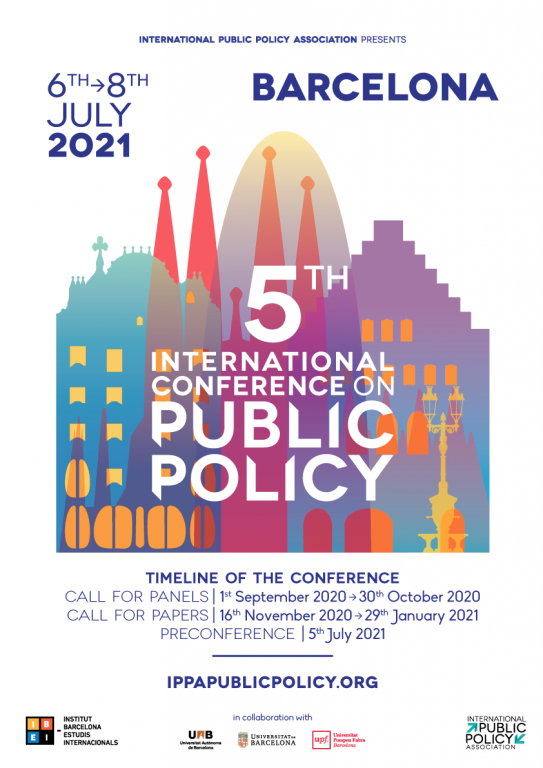

5th International Conference on Public Policy (ICPP5)
Contact: ozge.uluskaradag@concordia.ca
Deadline: Fri, 29 Jan 2021
Description of General Objectives and Research Questions:
This panel aims to address issues in policy research and practice that are related to gender and ethics. The panel has two main objectives. The first objective of the panel is to shed light on the unethical practices and behaviors that female, transgender and intersex students, researchers and academics face and are exposed to and their implications for academic progress, research creation and completion. Stemming from unequal power imbalances, such problems can have serious consequences for female, transgender and intersex academics and researchers and significantly affect their progress. This panel wishes to understand the prevalence of such problems, evaluate the impact of such variables on research creation and research completion and raise questions around ethics as well as research design which could be affected by the very practices that overlook gender dimensions, in the policy sciences and/ or other fields.
The second objective is to question whether the research ethics protocols in place, take into account the gender dimension in policy research that involves human participants. The existing research protocols focus on protecting and safeguarding the interests of the research participants and overlook measures that protect the interests of the researcher undertaking the study. Do existing ethics protocols involve appropriate measures to protect female, transgender and intersex researchers in risky fieldworks and/or in cases where these researchers might be in a more vulnerable position to carry out research? What are the institutional measures to address these issues? In cases where the necessary measures are absent, what could be the best course of action to address potential problems that might arise? This panel aims to find answers for such questions.
Justification of Its Scientific Significance:
Studies have pointed to the gendered system of social practices that disadvantages women in academia. This includes sexual harassment (Rosenthal et al., 2016), gender disparity and inequality in academic publishing and peer review (Lundine at al., 2018; Steinberg et al., 2018), a gender bias in student evaluations (Mitchell and Martin, 2018) and a gender gap in tenure and promotions (Ginther and Hayes, 2003; Ginther and Kahn, 2004; Goulden et al. 2011). With the current COVID-19 pandemic, many of the known barriers to women’s career advancement have been amplified (Malisch et al., 2020; Gabster et al., 2020). Similar discussions around the issues faced by transgender and intersex individuals are largely absent. While the interplay of barriers that disadvantage women, transgender and intersex individuals in academia is complex, ethical dimensions often feature in one-form or another. These have, however, not been studied from the perspective of research creation and especially not in the discipline of policy sciences. The goal of this panel is to focus on the ethical dimensions of research that female, transgender and intersex students, researchers and academics encounter in the policy sciences (and/or in general) so as to usher in a discussion about ways to overcome them and help pave the way for a conversation that extends to other underrepresented groups in the future.
Call for Papers:
This panel invites paper proposals that focus on exploring the relationships between ethics and gender in policy research and/or in general around the two main objectives identified in the panel description. The paper proposals could explore how unbalanced power relations influence female, transgender and intersex researchers, students and academics in terms of academic progress, research creation, completion as well as career paths. Paper proposals could include questions including but not limited to; what is the impact of sexist behavior on female/transgender/ intersex researchers’ ability to complete academic work and how does such behavior shape their career paths? What is the impact of unbalanced power relations on research creation and completion by female/transgender/intersex students, researchers or academics? The paper proposals could also deal with the differences between research ethics protocols across different institutions and explore how such differences might overlook the gender dimension in research and evaluate its implications. Paper proposals could focus on uncovering the challenges female, transgender and intersex researchers face during policy research and evaluate the impact of research ethics protocols on their research creation and completion. In addition, the proposals could question the institutional measures to identify loopholes and propose necessary measures that higher education and research institutions can take to protect female, transgender and intersex researchers during risky fieldworks or decrease their vulnerability, which might be caused by the existing ethics protocols or lack thereof.











